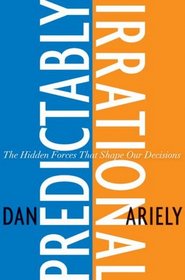Steven K. (sjk54) reviewed Predictably Irrational: The Hidden Forces That Shape Our Decisions on + 105 more book reviews
Helpful Score: 4
This book is very similar to The Tipping Point and Freakanomics - psychology and behavioral finance presented through fascinating examples in everyday life. An easy read - anecdotes, short stories as opposed to heavy science, textbook, or theory. I liked it better and found it more practical than the two books above.
4 stars out of 5
4 stars out of 5
Wendy N. reviewed Predictably Irrational: The Hidden Forces That Shape Our Decisions on + 177 more book reviews
Helpful Score: 1
Packed with "aha!" moments, this book should be required reading if you are a business owner, manager of volunteers, marketer, psychologist, or economist.
The exposition is full of entertaining social experiments the author (and company) have performed on the student body at MIT and others, substantiating the suprising premise of the book: that standard economic theory (which presupposes that we will consider the costs vs. benefits and make choices in our best interest) does not apply to almost any actual person. Instead, the first exposure we have to an item that links it to a value--however specious--will remain imprinted upon us and all future decisions will be based on comparisons with that initial value imprint. We overvalue what we already have, overreact to the idea of "free," and allow our expectations to cloud our experiences. We react much differently when arroused. We have issues with procrastination and self-control. And we make poor choices in order to keep our future options open.
Easy to understand style. In fact, there's no heavy intellectual lifting here; the text is written at about a second grade level (presumably because the author teaches at MIT).
The exposition is full of entertaining social experiments the author (and company) have performed on the student body at MIT and others, substantiating the suprising premise of the book: that standard economic theory (which presupposes that we will consider the costs vs. benefits and make choices in our best interest) does not apply to almost any actual person. Instead, the first exposure we have to an item that links it to a value--however specious--will remain imprinted upon us and all future decisions will be based on comparisons with that initial value imprint. We overvalue what we already have, overreact to the idea of "free," and allow our expectations to cloud our experiences. We react much differently when arroused. We have issues with procrastination and self-control. And we make poor choices in order to keep our future options open.
Easy to understand style. In fact, there's no heavy intellectual lifting here; the text is written at about a second grade level (presumably because the author teaches at MIT).
Kenneth T. (keninatl) reviewed Predictably Irrational: The Hidden Forces That Shape Our Decisions on + 4 more book reviews
Great book. Lots of thought provoking examples of how we think and act about social or market situations.
Great book - easy to read, and you'll definitely recognize your behaviour.




